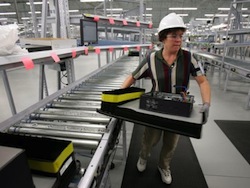Teradata Active Data Warehouse Private Cloud can Benefit Manufacturers
 There is no question that data warehousing can be a very effective tool for the manufacturing industry, providing unparalleled insights into the enterprise's supply chain and the overall manufacturing process. Just a few of the benefits include better management of product portfolios, improved sales and operations, better forecasting, support for quality control, analysis of emerging business trends – the list goes on.
There is no question that data warehousing can be a very effective tool for the manufacturing industry, providing unparalleled insights into the enterprise's supply chain and the overall manufacturing process. Just a few of the benefits include better management of product portfolios, improved sales and operations, better forecasting, support for quality control, analysis of emerging business trends – the list goes on.
One way to more effectively and efficiently enjoy the many benefits that data warehousing can bring is to move the application into a corporate private cloud to centralize and share computer resources and increase utilization.
But the deployment of any complex technology comes with its fair share of potholes, problems and confusions. For example, in a Forrester Blog, James Staten writes that often the difference between infrastructure as a service (IaaS) private clouds and server virtualization environments are misunderstood. Claims Staten, "…there are a lot of misperceptions about what it takes to get your private cloud investments right and drive adoption by your developers. The answers may surprise you; they may even be the opposite of what you're thinking."
He states that clouds should be smaller than you think, will be less expensive in terms of ROI than anticipated, and must be actively marketed internally. Also, you may think your server virtualization environment qualifies as a cloud, but you're probably mistaken.
And to make matters worse, that environment, whether its virtualization or a bona fide cloud, is probably being underutilized. In fact, according to a Gartner analyst quoted in CIO magazine, only about 25 percent of the available processing power of virtualized servers is being utilized by many companies that adopt virtualization.
Data warehousing in the cloud may give those utilization numbers a much needed shot in the arm. That's why Teradata headquartered in Dayton, Ohio, this week announced new private cloud capabilities for its venerable Teradata Active Data Warehouse (ADW) under the banner of the Teradata ADW Private Cloud.
The Teradata ADW has been providing customers with 90 to 100 percent utilization for years. With the private cloud, the company is addressing a major concern of CIOs – ensuring computer resources are optimized and fully utilized. In addition to reducing servers and storage, the approach saves on labor, data center space and power and cooling, the company claims.
Teradata lists the key characteristics of the Teradata ADW Private Cloud as:
• Virtualized resources – Teradata virtualizes all processing and storage so users do not have to be concerned about the location or availability of system resources – only that they are getting timely answers to all their business questions automatically without performance penalty.
• Business analytics – a Teradata Data Lab makes it easier for business users to explore unique data sets or prototype new analytic ideas.
• Consistent performance – enables IT to meet business user service level agreements and to ensure user satisfaction by leveraging Teradata's industry leading workload management as well as key technologies such as hybrid storage and columnar.
• Elasticity – delivers the analytic resources dynamically and in real time as business user demand increases and decreases.
• Scalability – enables the environment to scale seamlessly across multiple dimensions including number of users, number of queries, and data volumes with support for data scalability up to 92 petabytes.
Teradata is now delivering Elastic Performance on Demand to accelerate and facilitate a private cloud, pay-per-use model.
Says Teradata's Chris Twogood, director, product and services marketing, "With Elastic Performance on Demand, Teradata ADW Private Cloud can quickly accommodate sudden spikes in user activity, such as unexpectedly high demands in fad-driven manufacturing orders." Seasonal demand swings resulting from holiday promotions can also be anticipated and accommodated.
Twogood adds, "Business analytics users can self-provision analytic workspaces to test new applications and try out new analytic ideas, make product predictions and forecasts used for new launches and campaigns, as well as conduct analysis of supplier risks, plus perform analyses to optimize inventory levels."
Based on the analytics that are readily available through the cloud-based data warehouse, management can identify and deal with rapidly emerging business trends including detecting early warning signals that a potential problem may be on the horizon. The manufacturer also will have the information needed to identify product lines that are no longer profitable.
Scott Gau, president of Teradata Labs, states, "Leading companies have consolidated underutilized servers and storage onto a Teradata ADW Private Cloud, reducing costs – while increasing utilization of their IT resources. By eliminating data marts, many with only 10-20 percent utilization, companies can consolidate onto a Teradata ADW Private Cloud running at 90 to 100 percent utilization."
Gau adds, "Through our Teradata ADW Private Cloud, we are the only data warehousing company providing CIOs a huge return on investment with fully utilized computing resources, while delivering to business users the flexibility of self-service data warehouse resource provisioning – and it's available to customers today."
Also quoted in the Teradata press release is Mark Madsen, president of IT analyst firm Third Nature, who comments, "The combination of on-demand provisioning, an elastic model for adding and removing resources at any time, and pay-for-use pricing bring the key cost and agility benefits of cloud computing to the data warehouse. The cloud is the future of IT infrastructure but public cloud offerings don't meet the performance and availability requirements of BI workloads today. For the near future we need private cloud offerings like this."










